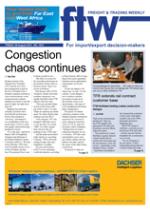Most have heard the saying
“Africa is not for sissies” -
but more so when you plan to
import heavy, bulky mining and rail
equipment.
Bradken, an Australian-based
manufacturing business, figured as
much despite surviving the great
depression, two world wars and a
financial crisis.
An internationally recognised
manufacturer of quality engineered
products, the company saw much
potential in growing its African
operations but realised it would
need a local presence.
In February 2010 it opened its
doors on African soil employing
Africans to take the business
forward on the continent.
“The first rule of good importing
is having the right people in the
right positions – and that is why the
office was opened with local people
as they have the right knowledge
and expertise,” says Pieter van Zyl,
Bradken South Africa commercial
manager. “Bradken is a customerfocused
company, at heart
committed to providing innovative
products. To achieve that it is
necessary to be close to one’s
customer base at all times.”
The South African office has
seen rapid growth in the past year,
showing the knack, much like its
Australian mother-company, of
being able to adapt and change its
direction to suit market demand.
Van Zyl says this is due in part
to finding the right people for the
job but also being in contact with
customers at all times.
“An example in point was a
recent contract for tracks that we
signed with a mine in Botswana.
Once we had visited the mine we
realised that the order would have
to be amended as the wrong type
of tracks had been purchased for
the terrain on which they would be
used.”
From the beginning, the family
orientated company developed
a commitment to research and
development. This can be seen in
its South African operations. “We
believe in using well-qualified and
experienced technical specialists,”
says Van Zyl. “It is important to
ensure our product developments
are meeting our customers’ needs
and expectations in terms of
safety, performance and costeffectiveness.”
With a new manufacturing site
planned for China, the company
has shown resilience through
some extremely hard economic
times but continues to grow.
This, says Van Zyl, is due to its
open communication policy with
customers.
“It is important to give customers
exactly what they want and need
especially when one looks at the
type of equipment we import – it
is big, bulky and heavy and just by
its nature leaves very little room for
mistake.”
Van Zyl says when it comes to
heavy equipment of any nature
experience speaks volumes. “You
have to use reputable transporters
who understand that they cannot
make mistakes and have the right
equipment at hand to move the
goods through the country.”
On average it takes the company
about four weeks to bring goods
into South Africa through the port
of Durban. “We then use road to
deliver to the door of our clients.
We have a policy to ship to the
closest port so our other African
clients are serviced the same way
but using the port closest to the
customer.”
Project cargo manufactured in
another country usually has to be
returned to the country of origin
should it be broken as the facilities
in the country of delivery usually
are not able to do so. The cost
implications along with the huge
amount of time it would take means
that reliability and dependability
become crucial factors in the
transportation of the cargo.
“Our shipping up to now has
been reasonably easy and our
biggest challenge remains the
strikes at the port as these impact
negatively on delivery times.
We believe success lies in using
reputable transporters who know
how to move big, heavy and bulky
equipment.”
Van Zyl agrees that success
lies not just in having the right
equipment to move project cargo,
but also in ensuring safety at all
times. “This cargo is big and it
is heavy and if it falls it means
someone gets hurt. Safety of the
people involved is key, but also the
safety of the equipment as it is not
easy to just send back to fix.”
While the experts, like Bradken,
may make it look easy to move
big heavy pieces of equipment
seamlessly across continents it all
comes down to good planning.
Handling large, heavy and
complex equipment requires
very special skill sets as the
consequences of not getting it right
can be huge.
Local expertise does it for Oz manufacturer
26 Aug 2011 - by Liesl Venter
0 Comments
FTW - 26 Aug 11

26 Aug 2011
26 Aug 2011
26 Aug 2011
26 Aug 2011
26 Aug 2011
26 Aug 2011
26 Aug 2011
26 Aug 2011
Border Beat
Featured Jobs
New
